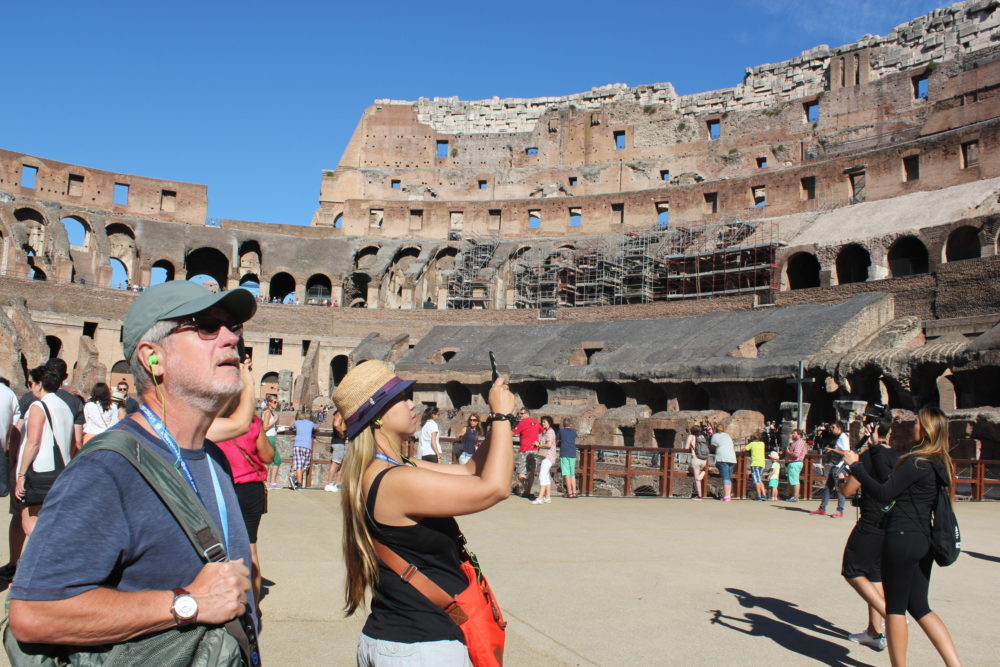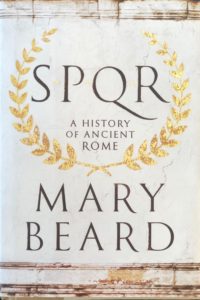
Rome’s Colosseum: Bread, Circuses, and Christians (maybe)
We joke that Padre, standing in THAT place in Rome’s ancient Colosseum, would soon be toast, considering his chosen profession. Just a light snack for the snarling lions bearing down upon him, all while the raucous crowd cheers on his imminent demise.
History supports some of that scenario, but not all. The picture we have of cowering Christians huddled in fear as prowling lions stalked them is more a Hollywood invention than Roman reality, although it may have happened; we just don’t know for sure.
At times in Rome’s early history, Christians were persecuted, of course, but beheading, not shredding-by-lion, may have been a more likely fate (think: Apostle Paul). No records exist of Christians in particular going to their deaths in the Colosseum, although it may have happened, since they were among Rome’s poorest citizens, the usual victims of Rome’s “Bread and Circuses” spectacles.

These spectacles fed the maw of the bloodthirsty Roman rabble for a few centuries, and served a crucial purpose: keeping citizens entertained and distracted to quell complaints about Rome’s entrenched problems. There really were food stalls along the outer concourses (the ‘bread’), and the circus reference was to the roundness of the place. That came about because the traditional half-circle Roman amphitheaters couldn’t fit enough Romans, so clever designers figured out how to ram two amphitheaters together to hold 50,000 people at a time.
The true marvel of the Colloseum is in its engineering, and today’s sports fans have its engineers to thank for, say, how fast they can get to the bar to watch game reruns. Contemporaneous accounts agree that after cheering for (thumbs up!) or against (thumbs down!) their gladiators of choice, 50,000 Romans could exit the place in 15 minutes, due to its ‘vomitorium’ exit hallways. I bet you always wondered where the word ‘vomit’ came from, didn’t you? Right from the Romans, for inventing arched stairway structures that ‘vomited’ the masses back out into the streets.
If Padre was unfortunate enough to find himself in the arena of death awaiting his doom, odds are he would be ripped to shreds by a bear, boar, or vicious dog, not a lion, because lions were much harder to come by. Roman leaders used Colloseum spectacles to show off exotic finds from far-off lands – including elephants, giraffes, and crocodiles – in order to boost support for their glorious conquests overseas. Any lion, of course, would have had to be transported back to Rome from Africa; a difficult task even today. So more often than not, there was a lion shortage.

Even without lions, the shows were designed to be thrilling. To enhance the audience’s excitement and surprise, an elaborate system of cages, elevators, and pulleys made animals pop up or magically disappear unexpectedly from the underground staging areas. And to make the crowd cheer even louder, skilled stagehands might conceal a ferocious animal behind a blind, so the crowd would know what’s coming but the doomed victim would not. Clever killers and suspense builders, those stagehands; they’d be well-paid moviemakers today, I’ll bet.

And the shows could be so fun that they were almost funny sometimes, despite all the death. In this excerpt from Mary Beard’s exhaustively researched but highly readable history of ancient Rome, SPQR*, she captures the spirit of the times:
The emperor Commodus, dressed as a gladiator and threatening the senators in the front-row seats of the Colosseum by waving the head of a decapitated ostrich at them, is often taken to sum up the ludicrous sadism of corrupt autocracy. One eyewitness, describing the incident, admits he was terrified but, at the same time, so dangerously close to laughter that he had to pluck some laurel leaves from the wreath he was wearing and stuff them in his mouth to stifle the giggles. (p. 398).
All well and good, as long as you weren’t a padre.
*abbreviation for the Senate and People of Rome.


